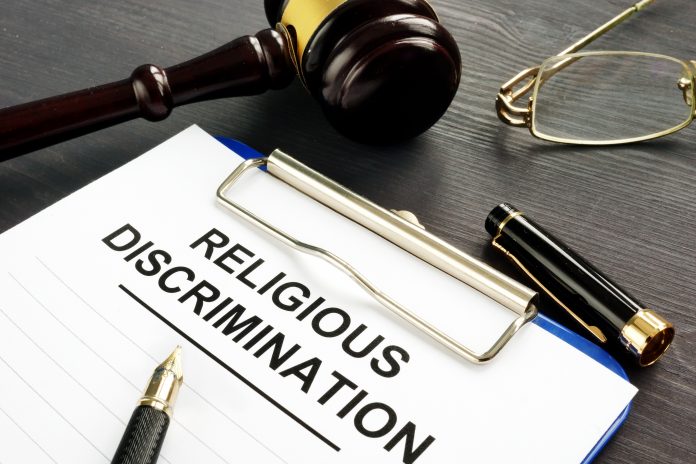“There have been substantial denials by various state institutions, even very detailed and well-supported exemption requests, especially as related to COVID,” said Devin Watkins, an attorney with the Competitive Enterprise Institute. “Public institutions are bound by the First Amendment to consider religious exemptions; private companies are not. That said, … I think a lot of [public institutions] are doing everything they can to deny religious exemption claims concerning COVID, and time will tell if they are successful or not.”
The New York State Department of Health issued a regulation requiring most health care workers to receive an initial dose of a COVID-19 vaccine by September 27, denying any religious exemptions. Seventeen state medical professionals filed suit, claiming the requirement violates the First and Fourteenth Amendments, the Supremacy Clause, and the Equal Protection Clause of the U.S. Constitution.
A U.S. District Court in New York issued a temporary restraining order on September 14 allowing state workers to request exemptions. Gov. Kathy Hochul said she will fight the ruling.
On October 29, the U.S. Supreme Court declined an emergency request to block a Maine rule requiring health care workers to receive a COVID-19 vaccine, with no exemption for religion.
In his dissenting opinion, Justice Neil Gorsuch wrote, “Maine does not explain how denying exemptions to religious objectors is essential,” which “borders on the irrational.”
Unvaccinated Student-Athletes Sue
Western Michigan University barred unvaccinated student-athletes from participating in collegiate sports this fall. Sixteen student-athlete students sued because they were denied exemptions for religious reasons. The U.S. Court of Appeals for the Sixth Circuit issued a preliminary injunction against enforcement of the mandate on October 7.
Watkins says the Western Michigan case could prove pivotal.
“It will take a while for cases like this to wend their way through the courts to a final decision,” said Watkins. “Still, the college was rather egregious in this case, denying without cause given or outright ignoring the requests for exemption. The school even said they had granted the students’ request for an exemption, even while denying their ability to play sports.
“The school’s arguments were rather insane,” said Watkins.
The Michigan decision was unsigned and limited, says Andrew Schlafly, an attorney for the Association of American Physicians and Surgeons, which has fought vaccine mandates.
“The court merely said that the college had to give a reason for denying the request for a religious exemption,” said Schlafly. “That decision is not enough, but many other lawsuits are still trying.”
Denying Religious Claims
Religious exemption claims are not finding favor in all lower courts.
Williamson College of the Trades, a private school in Pennsylvania, expelled a student for not complying with the school’s COVID-19 vaccine mandate despite the student’s request for a religious exemption. A county court of common pleas upheld the expulsion.
A U.S. District Court also denied a student’s motion for a preliminary injunction against vaccine orders at the University of Massachusetts. The case is on appeal.
“Some people view religious views so disdainfully that any other reason given is seen as a more important reason, and therefore a reason to ignore the religious views,” said Watkins. “This becomes a very big problem when there is a ‘balance of the equities’ such as when seeking injunctions. Often those who don’t view religious objections as important just claim the balance goes the other way.
“These cases are going to continue to be fought over in the lower courts until either the Supreme Court steps in, which seems likely, or there is agreement among the circuits, which to me seems unlikely,” said Watkins. “The Supreme Court [has] a fairly strong view in favor of religious exemptions so far.”
Governors Block Biden Order
In July, President Joe Biden began requiring federal employees to be vaccinated against COVID-19 and promised to require private-sector employers with more than 100 employees to mandate COVID-19 vaccines or conduct weekly testing on those who decline the shots.
In response, several Republican governors issued executive orders blocking enforcement of the federal mandates, including Kay Ivey of Alabama, Doug Ducey of Arizona, Ron DeSantis of Florida, Mike Parson of Missouri, and Greg Abbott of Texas.
Many private employers are making COVID-19 vaccination a condition of employment, and denial of religious exemptions may be difficult to overturn in court, says Doug Seaton, an attorney and president of Upper Midwest Law Center, a public interest law firm representing employees.
“Even where people are going through the motions, employers seem to be pretty peremptory in [denying] them,” said Seaton.
“Because [employees] have the right to practice religion, employers are not supposed to be scrutinizing the tenets of the faith and determining whether … there is a sincere request for religious exemptions.”
Schlafly says employers should not make such determinations.
“There should not be any in-depth analysis of someone’s religious beliefs,” said Schlafly. “His or her word should be taken at face value.”
Forced to Sue
Clients with a strong basis for seeking a religious exemption are being met with denials more frequently, says Seaton.
“We’re exploring cases where there is denial we don’t think is appropriate,” said Seaton. “There shouldn’t be any mandate on this at all. We’ve backed a few employers down who were very cavalierly denying exemptions.”
Few employees are willing to risk their livelihood for a case they might lose, says Seaton.
“The only way to test these things if they are denied is to get fired and fight your way through the courts and agencies, which could take years to do,” said Seaton.
Ashley Bateman (bateman.ae@googlemail.com) writes from Virginia.
This article was updated on November 3, 2021.






















This isn’t about public health. This is a “test vehicle” of the supremacy clause of the U.S Constitution. These “authoritarians” are just getting started. This is, in fact, a “hill to die on” if you (still) believe in individual liberty and a Constitutional Republic…
I fully agree with your assessment, Mr. Verret.